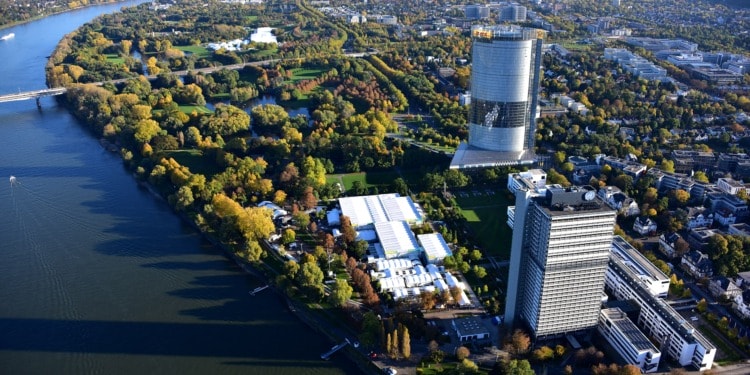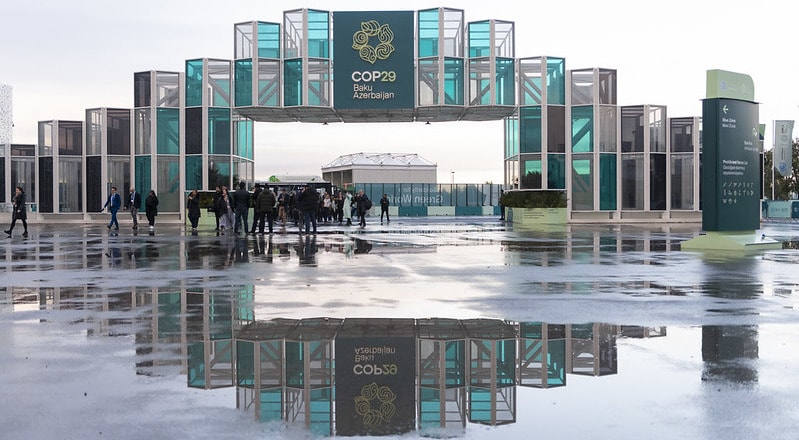The 2023 Bonn Climate Change Conference (SB58), which will run from June 5 to 15, is an important milestone on the road to Dubai and is expected to tackle many of the topics that will be key to the COP28 negotiations scheduled to take place in December.
Formally known as the 58th session of the Subsidiary Bodies of the United Nations Framework Convention on Climate Change (UNFCCC), SB58 will be held at UNFCCC headquarters in Bonn, Germany, which has hosted an intersessional session of this kind every year since 1997.
These sessions, which fall at a crucial point during the lead-up to COP each year, convenes the two permanent subsidiary bodies to the UNFCCC, the Subsidiary Body for Scientific and Technological Advice (SBSTA) and the Subsidiary Body for Implementation (SBI).
Each year, the conference provides a stepping stone from the previous COP to the next by maintaining the momentum achieved at the last round of climate negotiations and providing a space to lay the groundwork for further progress in upcoming negotiations.
#COP27 President Sameh Shoukry ahead of #SB58/#BonnClimateConference:
“We must seize every opportunity to renew our science-based resolve to adhere to the principles of the Convention and Paris Agreement”
📖 full @UNFCCC release: https://t.co/woDW2qcAAy
— COP27 (@COP27P) June 1, 2023
According to the UNFCCC, SB58 is “designed to prepare decisions for adoption at COP28.” So, what can we expect to be discussed?
Article 6: Further steps toward an international carbon market?
One of the key discussions happening at SB58 will revolve around operationalising Article 6 of the Paris Agreement.
Article 6 refers to nine paragraphs within the Agreement that allow for “voluntary cooperation in the implementation of their nationally determined contributions.” In other terms, the article allows for the use of carbon markets as a method for parties to achieve their emissions reductions targets – also known as nationally determined contributions (NDCs).
This carbon market exists separately from the voluntary carbon market, which corporations might use to boost their own eco credits, but it operates along the same fundamental principles. Tying a market value to GHG emissions offers an extra incentive to polluters, both at a business level and a national level, to find ways to reduce emissions.
The idea for an international carbon market that exists under the oversight of the UNFCCC, whilst worthwhile in theory, has been contentious and challenging to put into practice, but a package of rules about how to operationalise Article 6 was finally agreed in 2021 at COP26.
Nonetheless, there is still more work to be done on Article 6, much of which will be discussed in Bonn in the coming weeks. Points still under discussion include:
- the architecture and mechanisms of the marketplace,
- the organisation of the registries that will be used to authorise and track these credits.
- clarification about the scope of activities that will fall under the umbrella of eligible “mitigation outcomes”
Specifically to the last point, a recommendation from the supervisory body to include carbon removal credits in this marketplace was left for further negotiation after COP27. This was due to concern expressed by civil society groups that the recommendation provided a broad definition of removals and did not distinguish between types of removals, specifically each activity’s requirements, risks and implications.
Whether emissions avoidance and conservation enhancement activities should be eligible for credits will also be discussed.
As flaws within the voluntary carbon market have shown, transparent answers to these questions alongside a well-regulated marketplace will be key to the success of this mechanism for achieving NDCs through international cooperation.
Related Articles: First UN Climate Conference Since the Start of the Ukraine War Begins | Bonn Conference Ends in Disagreement Over Climate Compensation | Oil Baron Elected President-Designate of COP28: How Has the UN Allowed This? | Cutting Emissions: Can The Rich Pay the Poor To Do it On Their Behalf?
The Global Stocktake of the Paris Agreement: Nearing a conclusion to find the right course of action
The end of the Global Stocktake, as set out by the the Paris Agreement (GST), is perhaps one of the most anticipated milestones that will be marked at COP28. The first of the GST’s three phases – collection and preparation of information – began at COP26, and SB58 will mark the end of the second phrase – the technical assessment.
The global stocktake is a moment to take a long, hard look at the state of our planet and chart a better course for the future. 🌎
Find out why it's a game-changer when it comes to global efforts to address climate change.
➡️ https://t.co/fqr25EghzT#BonnClimateConference pic.twitter.com/D7x4gQX7i1
— UN Climate Change (@UNFCCC) June 1, 2023
The third technical expert dialogue, which will be held at SB58, officially marks the end of this second phase, which focussed on taking stock of the implementation of the Paris Agreement to assess collective progress towards achieving the purpose and long-term goals of the Agreement.
Negotiators will discuss the final outputs of this process in the coming weeks and clarify what is required to close the gap between where the world is now and where it must be. This process is expected to help the world recalibrate their ambitions and demonstrate high-level political commitment to transformational climate solutions.
The UN has described it as an opportunity for a course correction, with UN Climate Change Executive Secretary Simon Stiell saying:
“For many people around the world, limiting warming of our planet to 1.5 degrees Celsius is a matter of survival. The global stocktake is the opportunity of a generation to correct the course we are on, to design a way forward to tackle climate change with fresh vigor and perspective.”
Climate Finance: Taking steps to operationalise new funding for mitigation, adaptation and loss & damage
One of the headlining outcomes from COP27 was the establishment of a Loss & Damage Fund, which will create a mechanism for the Global North to provide compensation for the damage incurred by the changing climate to the less developed countries.
In pursuit of this goal, SB58 will host the Second Glasgow Dialogue on Loss and Damage, the first of which took place in Bonn last year at SB56. This dialogue will inform the work of the Transitional Committee in providing their recommendations at COP28 on the Loss and Damage Fund and relevant funding arrangements .
A decision about the host for the Santiago Network for Loss and Damage, which aims to improve access to technical assistance and support for developing countries against the adverse effects of climate change, is also expected at SB58.
Other climate funding arrangements under discussion include the New Collective Quantified Goal (NCQG), which is to adaptation and mitigation efforts what the L&D Fund is to loss & damage efforts.
The NCQG, which aims to ensure that developing countries have access to financing for adequate mitigation and adaptation measures, has a minimum target of $100 billion (USD) and expected to be operational by 2025.
It has been noted that this target, rather than reflecting the true financing needs of developing countries in the face of the climate crisis, was an arbitrary concept set out by developed country leaders. The Sixth Technical Expert Dialogue, which will take place at SB58, will be considering options on ways to determine the quantum of the NCQG and ways of framing the mobilisation and provision of financial sources in the NCQG.
As the first round of global climate negotiations to take place since the UN’s Intergovernmental Panel on Climate Change (IPCC) released its Sixth Assessment Synthesis Report (AR6), with urgent calls to cut emissions and dire warnings about the state of the climate, SB58 will play an important role in shaping the climate policy of the future.
Dr. Sultan Al Jaber, COP28 President-Designate, has said:
“The upcoming Bonn sessions are critical for shaping meaningful, pragmatic, and impactful outcomes at COP28…We express our full support for the Subsidiary Body Chairs and call on all Parties to ensure we make as much progress as possible across all tracks. Our aim is to build on the results of SB58 to achieve a balanced and ambitious outcome in the UAE this December.”
Although the outcomes from these climate conferences rarely live up to their expectations, a positive outcome at Bonn will be nothing less than crucial to the success of COP28.
Find more details about the events taking place here.
Editor’s Note: The opinions expressed here by the authors are their own, not those of Impakter.com — In the Featured Photo: Bonn, Germany. Featured Photo Credit: Wikimedia Commons.














